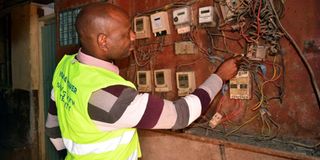Breaking News: Former Lugari MP Cyrus Jirongo dies in a road crash
Premium
Kenya Power moves to cut off all illegal connections

A Kenya Power employee inspects a meter box at an apartment in Tassia Estate, Nairobi.
What you need to know:
- Managing director Bernard Ngugi notes some connections were made outside their formal channels thus would have to be discontinued to reduce losses.
- There has been public outcry as customers are disconnected from electricity mains for having been connected illegally
If you have an illegally connected electricity meter, you will soon be cut off from supply, Kenya Power says.
Managing director Bernard Ngugi notes some connections were made outside their formal channels thus would have to be discontinued to reduce losses.
He said the company had heightened crackdown on those involved in the illegal connections as a way of cleaning its distribution infrastructure.
“Illegal connections are harmful to the business in two ways: they lead to revenue losses, and pose a danger to the public because these connections do not meet the set standards for network design, construction and maintenance thus posing the risk of electrocution. In mitigation, we are making the requisite investments in our people and systems, and reviewing our processes to bring this situation under control,” Mr Ngugi said.
There has been public outcry as customers are disconnected from electricity mains for having been connected illegally. The customers, however, claim they have either been paying power bills or buying units through Kenya Power’s prepaid system.
Makongeni estate
The latest stand-off between the electricity distributor and residents of Makongeni estate in Nairobi has rekindled the debate on illegal connections and whether there is need to formalise them to maximise revenue for the struggling company whose financials remain in the red.
The 6,000 households located along Jogoo Road first had their transformers carted away before they were reconnected. Kenya Power staff then returned to disconnect five transformers after the residents reportedly tapped power illegally from the line hence the current standoff.
The estate has had a long running standoff with Kenya Power over illegal connections, which they claim to be paying for monthly.
Early this year, Kenya Power embarked on disconnection of illegal power connections in some parts of the capital city, including Mlango Kubwa and Mukuru Kwa Njenga slums, where thousands were cut from supply.
The firm has dismissed the argument by the Makongeni residents that households were not meant to be disconnected during the Covid-19 pandemic saying it had not changed its policy on disconnection.
The company said it would also target defaulters as it partners with law enforcement agencies to stem losses even as it carries out customer education campaigns on the process of applying and paying for legal power connections.
“As a company, our focus is to ensure that customers remain connected and reliably supplied with electricity. It is not in our interest nor is it our desire to disconnect customers since we will also be losing on revenue. In addition, the company policy with regards to disconnection has not changed,” Mr Ngugi said.
Kenya Power recorded a rise in non-payment of bills following restriction measures to curb the spread of Covid-19. More than half a million customers had failed to pay electricity bills in the three months to June, pushing defaults to almost nine percent from its over seven million customers.
Depressed cash flow
Energy Cabinet Secretary Charles Keter recently told the Senate committee on energy that the defaults had hit Sh3.9 billion with the utility service provider now taking an extra hit on its depressed cash flow as customers failed to pay bills amidst the tough economic times.
The pandemic has seen several job losses and reduced business as companies cut operations to save on costs driving Kenya Power into dilemma to disconnect or count losses.
It turned out that some of the defaulting customers are essential service providers like water distributors and health facilities, according to CS Keter.
Kenya Power, which has also recorded Sh1.2 billion increase in operation and maintenance costs to keep power supply on during the pandemic, said it was engaging more customers to clear outstanding bills now running into over Sh24 billion.
“We are continuously communicating with our customers to remind them to pay their bills. We are also planning to amplify campaigns to educate our customers on efficient power use in order to manage their bills,” Mr Ngugi said.
Health CS Mutahi Kagwe had urged Kenya Power not to disconnect electricity when Kenyans delay in paying bills during due to the pandemic in what may have prompted some to intentionally default.
[email protected]. @Edwincowino





